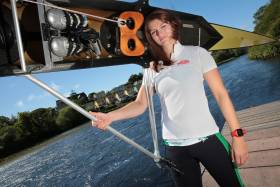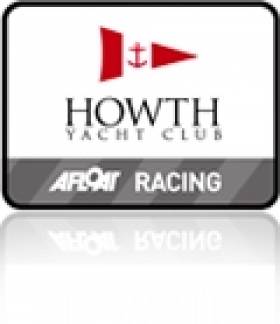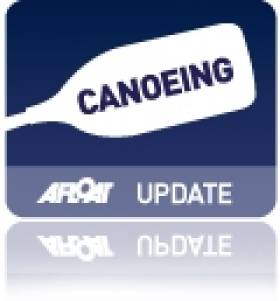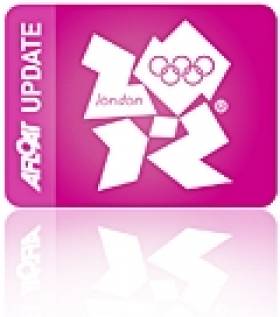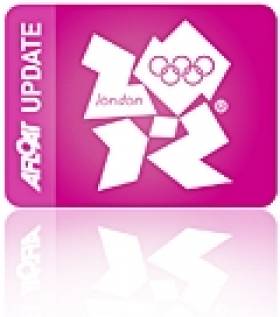Displaying items by tag: Qualification
Jacob and Neale and Dukarska Qualify at Henley
#Rowing: Dave Neale and Sean Jacob in the Double Sculls and Monika Dukarska in the Princess Royal for single scullers came through the qualifiers at Henley Royal Regatta today. Both are open events. Lady Elizabeth also made it through in the Wyfold for club fours. Trinity’s second crew, who rowed into a powerful headwind, fell just outside the qualifiers in the Prince Albert for student coxed fours.
Henley Royal Regatta – Qualifying Races (Irish interest)
Qualifiers: Princess Royal (Single Sculls; Women; Open): M Dukarska.
The Double Sculls Cup (Men; Open): D Neale and S Jacob.
Wyfold (Fours; Club): Lady Elizabeth BC
Non Qualifier: Prince Albert (Fours, coxed; Student): Trinity College, Dublin B
Jegou's Penalty-Free Run Not Fast Enough To Secure Olympic Place
#Canoeing: Ireland C1 paddler Liam Jegou finished outside the top 10 nations at the canoe sprint World Championships in Lee Valley in England today and missed out on this chance of qualifying the boat for the Olympic Games. Jegou went off second in his semi-final and had a penalty-free run down the course, but his time of 106.29 seconds was not fast enough to stand in the top 10 nations. Jegou came in 27th, ahead of Italy and Canada. Spain, Portugal and Australia also missed out.
Canoe Slalom World Championships, Lee Valley, London, Day Five (Irish interest)
Men
C1 – Semi-Finals (10 to Final): 27 L Jegou 106.29
K1 – Team Final: 19 Ireland 161.62
Youth Powerboat Courses At Howth Yacht Club In May
#HowthYC - Howth Yacht Club will soon be hosting an ISA-sanctioned powerboating course for beginner youths in mid-May ahead of a certification course at the end of the month.
The 'introduction to powerboat' course runs on the weekend of 18-19 May and is open to all club members aged between 14 and 20.
Members who complete this course would be at an advantage going on to the national powerboat qualification course on the weekend of 25-26 May, which is open for club members aged 16 to 20.
Both courses commence at 9.30am each day.
Application forms are available from the Howth Yacht Club website and must be returned by Thursday 16 May.
Olympic Canoe Slalom Qualifying Spots Snapped Up in Lucan
#CANOEING - The Irish Times reports that Eoin Rheinisch and Ciarán Heurteau have secured their canoe slalom qualification spots for London 2012 after last weekend's selection races in Lucan.
Three places were up for grabs in the men's K1, with the third yet to be confirmed after fourth-placed Patrick Hynes contested a touch on a gate by third-place finisher Sam Curtis.
Canoeing Ireland's recently appointed general manager Karl Dunne said the objection is currently being considered.Meanwhile, in the women's K1, the qualifying spots went go Hannah Craig, Helen Barnes and Aisling Conlon.
The qualifiers will be part of the European Championships in Augusburg, Germany from 10-13 May, where Olympic spots are available for boats from two countries not already qualified.
'Podium Athletes' Face Funding Cuts in 2013
#OLYMPICS - Yesterday Ireland's Olympic hopefuls celebrated recognition of their success in the 2012 round of funding.
But cuts to the budget of the Irish Sports Council (ISC) have prompted a "major" review of high performance programmes from 2013 onwards, the Irish Independent reports.
Finbarr Kirwan, director of high performance at the ISC, said: "Changes are coming, things are tight and we will have to make strategic cuts in the next two years."
The result could be fewer grant awards of lesser value for athletes, as Olympic qualification standards are set to get tougher from here on out.
The two tiers below 'podium class' - in which individuals receive awards of €20,000 and €12,000 respectively - are expected to be hardest hit in the review.
As previously reported on Afloat.ie, canoeing's Eoin Rheinisch, swimmer Grainne Murphy and sailors Annalise Murphy, Peter O'Leary and David Burrows each received the top level of funding of €40,000 each, which is on a par with last year's support.
The Irish Independent has more on the story HERE.
100 Days until Olympic Qualification Begins at Perth 2011
For all the fine performances this year from Ireland's Olympic squad a place on the start line of next year's Olympic regatta is contingent on a result at the next ISAF World championships in 100 days time. It's a do or die event for Annalise Murphy, Peter O'Leary and David Burrows and the rest of the crews who have already shown their Olympic worth at ISAF events this summer but Perth is where 80% of nation places will be dished out.
UK Photographer Ingrid Abery has loaded some excellent breezy weather shots from Weymouth Regatta of Star pairing O'Leary and Burrows onto the Afloat Gallery here.
Perth 2011, the organising committee for the 2011 ISAF Sailing World Championships, will tomorrow (Tuesday 23 August) celebrate a significant milestone with just 100 days to go until the biggest international sailing event of the year.
The World Championships will take place from 3-18 December, with 1200 athletes from 80 nations competing for 10 World Titles in the fresh breezes off Fremantle in Western Australia. The World Championships are also the key qualifier for the sailing competition at the London 2012 Olympic Games, with 75 per cent of places in London being decided in Perth in December.
Perth 2011 Chairman Ian Campbell said that a significant buzz is starting to build around the World Championships.
"Perth and Fremantle provide some of the best conditions for sailing in the world," Campbell said.
"Combine these naturally favourable conditions for the sport with the hospitality and warmth of Fremantle and Western Australia and the Perth 2011 ISAF Sailing World Championships are poised to be memorable.
"The Worlds Festival programme is shaping up very nicely and North Street Productions are committed to ensuring that there is something for everyone attending the World Championships away from the water as well as on it.
"Perth is set for "grandstand sailing" as the Medal Races for each class will be sailed just metres from the shore on Centre Course, allowing spectators to witness the excitement of the World Championships first hand.
"There's a great team working very hard at Perth 2011 to ensure that when the world turns to Perth in December, we'll be ready to provide a wonderful platform for the best young sailors on the planet to realise their World Championships and Olympic Games dreams," Campbell said.
Running parallel to the sailing competition will be the Worlds Festival, a 16 day cultural programme that will include more than 200 free events. The Worlds Festival will be centred on, but not limited to, the Worlds Village on Esplanade Park in Fremantle, with venues around Perth's port city hosting theatre, art exhibitions and music performances through the 16 days of the Worlds Festival.



























